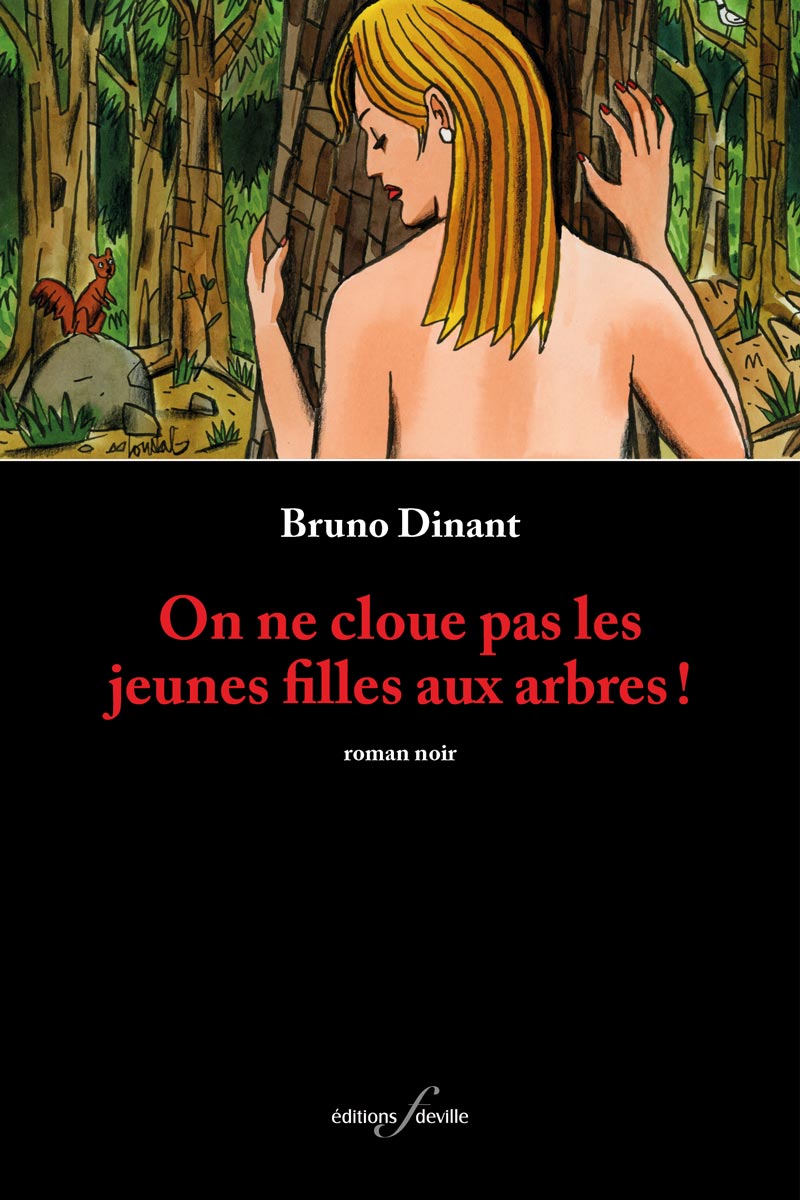Bruno Dinant
The story opens with the murder of the "tree girl", killed by a crossbow bolt in the back as she embraced the great oak in the Bichelour woods.
Sylvain, son of the lord of Haute-Roche, had met her a few weeks earlier. Her name is Saulène. She tells him she has the gift of talking to trees and has returned to the area to find out who killed her grandmother, Jeanne Barbanson, right there at the foot of the hundred-year-old oak. During this first exchange, the young girl discovers that Sylvain also possesses the gift, and she wants to make him her ally in urging the trees to deliver the dark secrets they have been silently witnessing. As his attraction to Saulène grows, Sylvain can't help thinking of Lauriane, his childhood friend and now lover, since he first kissed her at the village ball nine months earlier. Nine months during which the two young people had to learn to manage their respective desires, Lauriane initially refusing any intimate relationship. Until the evening when, on the advice of her mother Laura, she joined Sylvain for a first night of love, in one of the rooms of the gîte he was setting up in the château's outbuildings. Other nights followed, and little by little, the couple found each other and openly flaunted their love in the streets of Haute-Roche, so much so that everyone expected the two lovebirds to get married soon. That's where they are today, when the girl in the trees turns the young man's life upside down.
On his third encounter with Saulène, the evening of the bonfire festival, Sylvain and the girl lie together on the intertwined roots of a pair of old oaks. When they abandon themselves in each other's arms, the trees reveal to them the beginnings of the drama that played out at their feet: it was there that Jeanne Barbanson came to meet a certain Florent, and it was her love for him that killed her. Disturbed by the overwhelming desire that drove him into Saulène's arms, Sylvain hurriedly left the girl to join Lauriane at the bonfire, unaware that he would never see her again.
Inspector Bruno Barbulet is in charge of the investigation. He landed at the foot of the big oak tree the day after the murder and asked to be brought to the scene by the man who discovered the body, a certain Jean Pierlot. When questioned, he confessed that he had found the murder weapon, a high-precision crossbow, and that he had thrown it into the Semois because he had left his fingerprints on it. The policeman gets his hands on the weapon, and his research reveals that it was bought online by a certain Pierre Chalogneaux, a young village boy too primitive to conceive of such a murder. Everything leads him to believe that the weapon was stolen from him by the real killer. During his interrogation, he reveals to the inspector that he saw Sylvain making love to the girl in the trees on the night of the bonfire. He even filmed their lovemaking, but he's lost his phone and can't show her anything.
Sylvain is devastated when he learns of Saulène's death. He decides to work on the gift the girl revealed to him, to honor her and discover the truth about Jeanne and Florent's love affair. He returns to the oak couple and learns that he must go to the Lîresse mill. The inspector summons him to the station and, unable to lie, Sylvain confesses his affair with Saulène. He has therefore openly deceived his fiancée, and the inspector will have to question her about it. He gives the young man twenty-four hours to talk it over with her, or he'll have to tell her.
Sylvain puts off explaining himself to Lauriane. He prefers to go first to the Moulin de la Lîresse. There, he discovers a small chapel containing three rather damaged tombstones that give him a precious name: Charles Rohart. He had enough to continue his research.
Hubert de Bouvry, Sylvain's father, is worried about his son, who has been questioned by the police about the murder of young Saulène. He discusses the matter with Norbert, his butler, who reassures him to beware of the rumors circulating in Haute-Roche. On his return to the village, Sylvain can't escape a heated discussion with Lauriane. To his surprise, the girl already knows about his affair and doesn't seem to mind. While she's on her way to the police station, Sylvain heads off to Vresse to meet Father Bihain, a well-known genealogist whom his father knows well. From him, Sylvain learns that Charles Rohart was a sort of patriarch, reigning supreme over his small family, and in particular over his son Florent, whom he had forbidden to associate with a certain Jeanne Barbanson, with whom he was madly in love.
The interview between the inspector and Lauriane Duquesne is quite tense. The young woman admits she was aware of her fiancé's indiscretions, and resents being suspected of Saulène's murder. Meanwhile, Laura Duquesne, Lauriane's mother, accidentally discovers two crossbow arrows in the sports bag her daughter has left in her car. Panicking, she takes them on an impromptu jog to the banks of the Semois and throws them into the river. When she returns from her jaunt to check in with her daughter, the latter has driven off in her car, leaving a note in which she tells her she's gone to a friend's house for the evening.
At the end of the day, Inspector Barbulet returns to his room at the village inn and finds an envelope under his door with photos of Laura Duquesne swinging the two arrows into the Semois. He promises to question her the next day.
Sylvain, for his part, is awakened in the middle of the night by a thud. He slips noiselessly into the room next to his and finds Saulène's younger sister, Lilas, hiding as best she can for fear of being murdered too. He decides to put her up for the night, offering her his room.
The next day, Barbulet finds a stressed and uncooperative woman in front of him: Laura Duquesne is worried about the sudden disappearance of her daughter, who hasn't come home all night, and begs the inspector to find her. He gives in to her request and locates her phone some twenty kilometers away. He finds Laura's car along the Semois, doors open, stuck in a bed of pebbles. Her sports bag had been weighed down with stones and thrown into the river, but remained stuck just a few meters from the bank. It contained incriminating clues relating to the murder weapon. Laura is found a little further on, drunk and unable to say a word. She is taken to the emergency room and then back to the police station, where she is taken into custody.
When Lilas wakes up late the next morning, she has a long talk with Sylvain. She explains that, unlike her sister, she doesn't talk to trees. She's the flower girl. She knows them all, their scents and symbols, as well as the plants whose properties she masters. She advises Sylvain to ask the great oak to continue his sister's work. As for Sylvain, she remains hidden at the B&B, distrusting the police, who have done nothing to find her grandmother's murderer.
A few days later, Sylvain finds a mysterious note that seems to have been written by the murderer himself: Lilas is safe, because the two lives claimed have been taken and there will be no more deaths. This discovery prompts the young girl to step out of the shadows and go to the police station. And then to join Sylvain in his quest for the truth: thanks to Father Bihain's detailed explanations, he now knows that Charles Rohart's granddaughter, Madeleine Fourneau, is Laura Duquesne's mother. Even though she refuses to confirm the facts, Sylvain decides to use a subterfuge to go with Lilas to Les Bastions, a medical home where the old woman is being cared for with Alzheimer's disease. They retrieve a mysterious postcard that leads them to the home of one of Madeleine's childhood friends. She entrusts them with the diary of Catherine Pierret, the beautiful daughter of Charles Rohart, who married Florent after the death of Jeanne Barbanson, and who has written down some dark secrets. The two young people learn a terrible fact that dates back to the war: in exchange for a service rendered to a certain Felix Momper, who was involved with him in trafficking with the Germans, Charles Rohart could claim two lives from him in due course. The moment arrived when his son Florent fell in love with Jeanne Barbanson and got her pregnant: they both had to be killed, mother and daughter. Félix carried out his task, but was never able to reach Jeanne's daughter, who would rather die than reveal where she was hiding her child.
Sylvain and Lilas now know that the murderer is the last descendant of Felix Momper, who has just fulfilled a generations-old oath by finally settling the balance of the second life his grandfather owed to Charles Rohart. All that remains is to find out who it is.
It's Lilas who does it, without warning Sylvain, aided by the subtle plant fragrance
plant scent she smelled on the note left by the murderer.
She uses her botanical knowledge to make him drink a paralyzing herbal concoction without his knowledge, after finding all the evidence of his involvement at his home. She cocked her shotgun and placed the barrel under his chin to make it look like suicide. Sylvain finds her in time and prevents her from committing the irreparable act. The police bring in the new suspect, who soon confesses to being Saulène's killer. For his part, Sylvain wants an explanation for Lilas's thoughtless act. Lilas tells him he's asking too many questions. She'd just like to spend his last hours at Haute-Roche with him. She takes him to her bedroom.
The next day, Lauriane is released, but Lilas has left without a word. Months went by. One evening, on his way back from the Bois de la Bichelour, where he was conversing with the great oak, Sylvain came across Father Bihain sitting on a bench. They had a long chat. About genealogy, of course, but also about filiation and invisible loyalty. Sylvain confides in him his uneasiness: how can you choose between two paths when you can't see clearly? The old man tells him he must wait for a sign.
Nine months later, as Christmas approaches, the young man finds himself alone. Lauriane is on a snow trip with her girlfriends. Before she left, she promised to send him a card. A few days later, he receives two letters: the card promised by his fiancée from Avoriaz, and a strange birth announcement sent from Grasse by Lilas, announcing the arrival of a little Flora.
At this very moment, Sylvain knows that the time has come to make a choice.







